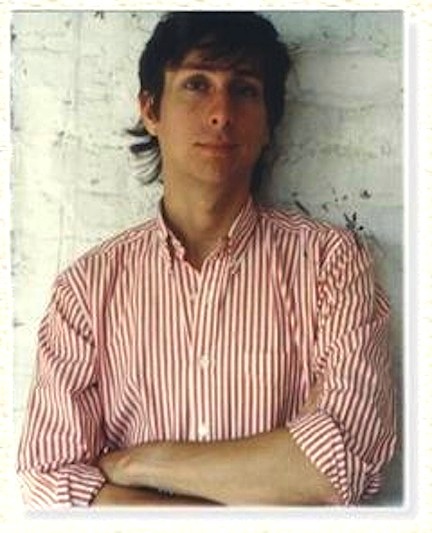
MICHAEL CALLEN was a force of the universe. As an important first-generation AIDS activist and longtime survivor, groundbreaking queer musician, buzzing gadfly to the powerful, member of the beloved gay men’s vocal ensemble The Flirtations, and co-inventor of Safe Sex, Michael Callen touched the lives and hearts of queer folk profoundly in the 80s and 90s. I knew Michael for many years in New York and was one of his primary caregivers during his inspiring last act in L.A.
Matthew J. Jones’ remarkable new biography, Love Don’t Need a Reason: The Life & Music of Michael Callen (Punctum Books), is a powerful telling of Mike’s journey and achievements. About what drew him so strongly to tell Mike’s story, Jones remarked: “At 42, I inhabit a generational sliver that missed the epidemic but grew up in its shadow. With no gay male role models, we pieced together ourselves, community, and history from cultural scraps: books, movies, media, nascent archives and social worlds online; any bits helped us connect the dots.”
Jones’ book deepens that soulful work of “connecting the dots” and building the queer lineage of how we understand who we are and where we are going. I spoke with him about this labor of love that he has now shared with us.
Tim Miller: When I first met you at University of Virginia ten years ago, I was so moved by the connection you felt to Michael Callen’s work. What path led you to explore Mike’s journey as a queer man and musician?
Matthew J. Jones: I’m committed to telling queer stories. Overall, LGBTQ+’s
remain largely ignorant of ourselves as people with history, people in history, people living history. Knowing our collective history facilitates the imagining and building of better futures.
My graduate work in archival, ethnographic, and intersectional feminist and queer theories prepared me to address these gaps in our culture memory. Then I “met” Michael via a bit of YouTube serendipity. By dumb luck, I contacted his surviving partner, Richard Dworkin, and things took off. I’ve never felt like the right person at the right time, except for this. As I dove into Michael’s papers, music, and activism, I met Michael’s larger queer, musical, and biological families. Everyone had a story to tell. The palpable love they all still feel for Michael was inspiring. With rejections from publishers piling up and the search for stable academic employment, I wanted to give up. But I had to write this book and find a home for it. It became my obsession.
TM: Your book really gets at the challenge of survival in Michael Callen’s journey—surviving a tough childhood surrounded by homegrown Ohio homophobia, surviving as an artist, and surviving AIDS for such a long time. Where do you think he found the resources to do this?
MJJ: Michael would say: “Luck, Classic Coke, and the love of a good man!” That’s his symbolic holy trinity. Michael was lucky. He was diagnosed as immune deficient before the term “AIDS” had been invented by his doctor, Joe Sonnabend, who Michael met by chance at a gay men’s health clinic. Later, Sonnabend cautioned against experimental treatments, especially AZT, and advocated known treatments for opportunistic infections, including pneumocystis pneumonia, an infection that killed many PWAs. Coke symbolized simple pleasures, sensual experiences like an exquisite meal. And love, which was his key to hope, was Michael’s guiding ethos. Hope compelled him. He certainly wrote and sang a lot about it: resisting the propaganda of hopelessness, “The Healing Power of Love,” “A Love Worth Fighting For,” “Love Don’t Need a Reason.” Michael was full of audacious hope.
TM: I love that your book takes Mike’s musical contributions so seriously in all their pop, activist, and AIDS-poster-boy incarnations. What did you discover about his musical journey?
MJJ: As for so many LGBTQ youths, music was Michael’s survival tool. Lots of us spent our formative years pacing around the gooey halls of Romanticism: Chopin, Rachmaninoff, a little Debussy. Then the pantheon of divas in popular music and musical theater gave us a voice for experiences we were denied—love, dating, sex, heartbreak. Through music, we live in the future tense until we find our community. I think it must have been the same for Michael.
Michael’s brother Barry described their family to me as a “Daddy Sang Bass, Mama Sang Tenor” kind of thing. They had instruments in the house: a Hammond organ, a piano (which was painted pink!), guitars, singing, and an eclectic record collection. Michael studied violin, sang in choirs, performed in musicals, and taught himself to play piano. He possessed an extraordinary, nimble voice with a stratospheric soprano range.
Michael was a brilliant musician, albeit not an especially prolific one, and wanted to make gay music for gay people. His friends encouraged him to straighten out his style in order to find a commercial niche. However, Michael was inspired by women’s music: Cris Williamson, Meg Christian, Holly Near, and Sweet Honey in the Rock. It frustrated him that gay men didn’t support gay male music with the same enthusiasm as lesbian women did. Nevertheless, he remained committed to making gay music as a solo artist and with The Flirtations.
Michael wrote songs and performed carefully selected cover versions of songs by others. His originals are really wonderful. “Nobody’s Fool” should be required listening for all queer folks with troubled parental relationships. “On the Other Side” is one of the most beautiful expressions of yearning I know. He also wrote political music about AIDS (“Living in Wartime,” “How to Have Sex”), the tyranny of gender (“No, No”), and events in gay history (“Innocence Dying,” which is still unreleased). Another of my favorites, maybe because it’s an election year and a census year, is called “Define the Family (The Census Song).” It perfectly captures Michael’s ability to speak truth to power, to say “fuck you” with a grin and a wink.
TM: It’s great that your book is so forthright about how sex-positive Michael was even amid the horror of AIDS. Indeed, it is such a bass note in his life as activist, musician, and queer man. What struck you about this?
MJJ: For me, sex education was an exercise in terror—the worst 19th-century case studies of untreated syphilis, presented with absolutely no context alongside pictures of people with untreated, advanced HIV disease. Scare tactics: “Do this and die.” For gay men of my generation, each love affair or liaison sang out to us like Liza Minnelli: “Maybe this time…” It wasn’t until much later that I understood that. When I taught LGBTQ studies, my students, especially those from rural backgrounds, were still having that experience.
When I first read How to Have Sex in an Epidemic: One Approach, the 1983 booklet Michael co-wrote with Joe Sonnabend and fellow PWA Richard Berkowitz that is widely considered the first safe-sex guide, I wondered: “Why isn’t all sex education like this?” It’s possible to talk about sex without pathologizing, stigmatizing, moralizing, shaming, or relying on inflammatory rhetoric and scare tactics. The book concludes with a meditation on the importance of love—not necessarily monogamy and marriage but love as an ethos that we express, in just one of many ways, through safer sexual practices.
I was drawn to Michael’s frankness and honesty as well as the humor he brought to the subject of sex. It wasn’t all gloom and doom, pus and blisters. From Michael, I learned to talk and think about sex frankly and honestly but also with love and humor.
TM: Michael Callen’s politics were fiercely intersectional and feminist as we see in his powerful AIDS anthem “Living in Wartime.” What can we keep learning from him about how to make change?
MJJ: We need each other, everyone in the LGBTQ+ alphabet rainbow. We need truly intersectional feminism to dismantle white supremacist capitalist homophobic ableist patriarchy in our own culture and in ourselves. Michael knew this and practiced it in his life, his music, and his activism. From him, we can also learn to exercise grace, to hold ourselves to high standards, and to learn from failure and setback. Above all, we gain a deep lesson in kindness, grit, determination, and hope.
TM: The loss of Michael Callen was so hard to bear, but we are lucky to have so much from him in his writing, interviews, and his music. How does he keep speaking to us today?
MJJ: The institutional forces of queerphobia and the impact of AIDS on our communities is real. So, too, the amnesia that followed. But Michael, through his activist work, his writing, the co-invention of safe sex and its continual evolution in the age of PrEP, his bravery, and most of all his music—he continues to remind us that one person really can change the world, and that Love Don’t Need a Reason.
Tim Miller is a solo performer and the author of A Body in the O and 1001 Beds.




